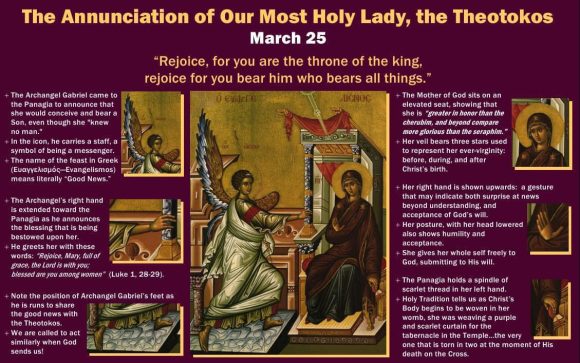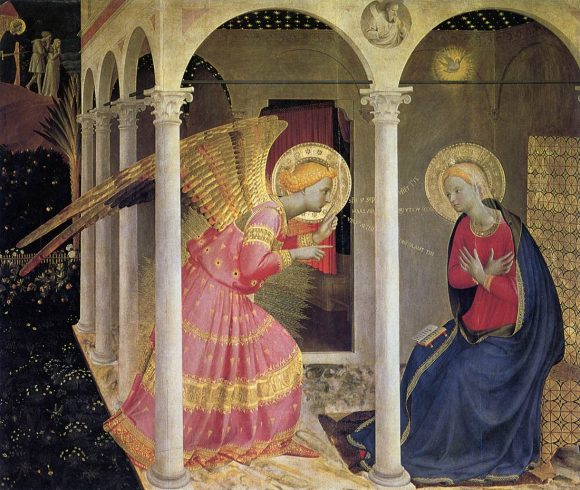Join us for the Divine Liturgy on Monday, March 25th at 9:00 am to celebrate this Mystery of the Incarnation –the feast of the Annunciation to Mary.
Tag: Annunciation
Annunciation of the Mother of God 2023
On Saturday, March 25, the feast of the Annunciation of the Mother of God –the beginning of our salvation the Divine Liturgy will be offered:
~9:45 a.m. Lytija and Blessing of Bread
~10:00 a.m. Divine Liturgy offered for the people of God
~the Anointing-Myrovann will happen at the end of the Liturgy
Feast of Annunciation
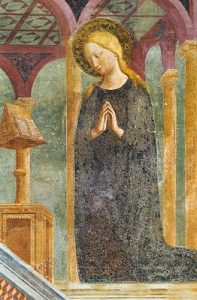 The Divine Liturgy will be served today, March 25, for the solemn feast of the Annunciation of the Holy Theotokos, Mary, the Mother of God.
The Divine Liturgy will be served today, March 25, for the solemn feast of the Annunciation of the Holy Theotokos, Mary, the Mother of God.
8:45 a.m. Lytija and Blessing of Bread
9:00 a.m. For the people of the parish; Myrovann (Anointing)
7:00 p.m. +Michael Lipcan Sr. (Pan.) requested by Barbara and Patrick Bagley
The Feast of the Annunciation is the announcement of the Archangel Gabriel to Mary, that she had been chosen by the Lord among all women to be the Mother of God, and the incarnation of the Word in her most pure womb.
Annunciation to Mary
Liturgy for the Annunciation TODAY
The Feast of the Annunciation
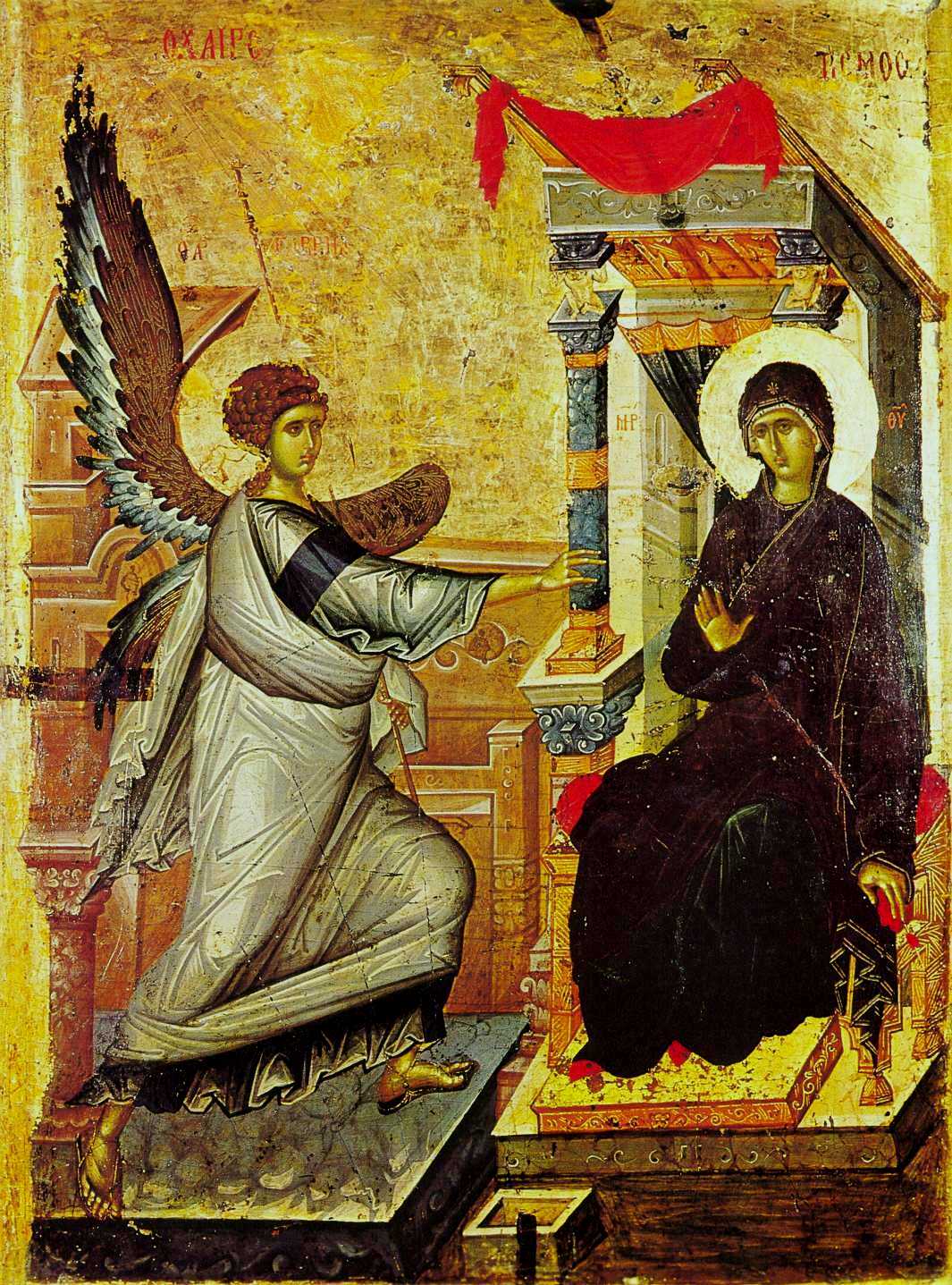 Today the Church celebrates summit of our salvation.
Today the Church celebrates summit of our salvation.
The Annunciation of Gabriel to Mary that she would be the Theotokos almost always falls during the Great Fast. (*) According to the liturgical norms, it is celebrated on whatever day it falls, and the Divine Liturgy is celebrated, even on Good Friday. (**) The meaning of the Annunciation, however, is in conformity with the meaning of the Great Fast. The Great Fast is a journey from the sin of Adam and Eve to the Resurrection of our Lord. It is a passage from human pride to fidelity to God’s plan of salvation. The sin of Eve, which became the fundamental sin of the whole human race was to choose one’s own plan for salvation over God’s. It’s result, though, was death. Jesus in the resurrection, takes the power of death and twists it into life, as St. Paul said, “We were indeed buried with him through baptism into death, so that, just as Christ was raised from the dead by the glory of the Father, we too might live in newness of life” (Romans 6:4).
Jesus was able to do this because he became a human being in the womb of Mary, who replaced Eve’s disobedience with obedience to God, “Behold, I am the handmaid of the Lord. May it be done to me according to your word. (Luke 1:38)” Thus, God “condescended” (that is, he came down to be with us) so that the plan of God could be lifted up. “Though he was in the form of God, [Christ] did not regard equality with God something to be grasped. Rather, he emptied himself, taking the form of a slave, coming in human likeness; and found human in appearance, he humbled himself, becoming obedient to death, even death on a cross” (Philippians 2:6-8). Therefore, the Annunciation is a part of Pascha, as Melito of Sardis explained in his Paschal Homily: “And indeed there were many other things proclaimed by numerous prophets concerning the mystery of the passover, which is Christ, to whom be the glory forever. Amen.”
When this one came from heaven to earth for the sake of the one who suffers, and had clothed himself with that very one through the womb of a virgin, and having come forth as man, he accepted the sufferings of the sufferer through his body which was capable of suffering. And he destroyed those human sufferings by his spirit which was incapable of dying. He killed death which had put man to death” (65-66). We sing, “Today is the summit of our salvation.” (Troparion)
The Annunciation
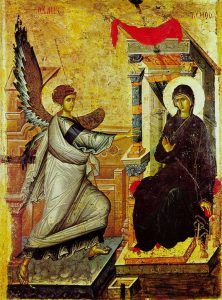 Today is Palm Sunday; it is also the solemn feast of the Annunciation to Mary by the Archangel Gabriel. We celebrate both on the same day.
Today is Palm Sunday; it is also the solemn feast of the Annunciation to Mary by the Archangel Gabriel. We celebrate both on the same day.
The Annunciation of Gabriel to Mary that she would be the Theotokos almost always falls during the Great Fast. (*) According to the liturgical norms, it is celebrated on whatever day it falls, and the Divine Liturgy is celebrated, even on Good Friday. (**) The meaning of the Annunciation, however, is in conformity with the meaning of the Great Fast. The Great Fast is a journey from the sin of Adam and Eve to the Resurrection of our Lord. It is a passage from human pride to fidelity to God’s plan of salvation. The sin of Eve, which became the fundamental sin of the whole human race was to choose one’s own plan for salvation over God’s. It’s result, though, was death. Jesus in the resurrection, takes the power of death and twists it into life, as St. Paul said, “We were indeed buried with him through baptism into death, so that, just as Christ was raised from the dead by the glory of the Father, we too might live in newness of life. (Romans 6:4)” Jesus was able to do this because he became a human being in the womb of Mary, who replaced Eve’s disobedience with obedience to God, “ “Behold, I am the handmaid of the Lord. May it be done to me according to your word. (Luke 1:38)” Thus, God “condescended” (that is, he came down to be with us) so that the plan of God could be lifted up. “Though he was in the form of God, [Christ] did not regard equality with God something to be grasped. Rather, he emptied himself, taking the form of a slave, coming in human likeness; and found human in appearance, he humbled himself, becoming obedient to death, even death on a cross. (Philippians 2:6-8)” Therefore, the Annunciation is a part of Pascha, as Melito of Sardis explained in his Paschal Homily: “And indeed there were many other things proclaimed by numerous prophets concerning the mystery of the passover, which is Christ, to whom be the glory forever. Amen.
Fourth Sunday of Great Lent
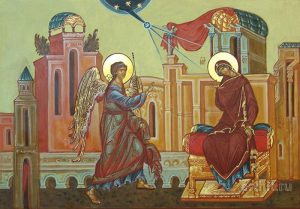 This weekend we are celebrating the mystery of our Lord’s accepting human nature for our salvation. The Archangel Gabriel asks Mary to receive God’s plan and become the mother of the Son and Word of God, to be named “Jesus,” “Savior.” Mary replies, “Behold, I am the handmaid of the Lord. May it be done to me according to your word. (Luke 1:38)” Mary’s response to God was perfect and reversed the sin of Eve. In our Lenten journey, we are asked the same question by God, “Can you be perfectly obedient to my will.” This is not to put us into slavery, but to free us from the power of sin and death. Jesus gave the power to cast out evil to his followers, but in this Sunday’s Gospel, a distraught man who has a son possessed by a demon, comes to Jesus and laments, “I asked your disciples to cast it out and they were not able. (Mark 9:18)” Jesus immediately tells the man it is because of their lack of faith, “O faithless generation, how long am I to be with you? (Mark 9:19)”
This weekend we are celebrating the mystery of our Lord’s accepting human nature for our salvation. The Archangel Gabriel asks Mary to receive God’s plan and become the mother of the Son and Word of God, to be named “Jesus,” “Savior.” Mary replies, “Behold, I am the handmaid of the Lord. May it be done to me according to your word. (Luke 1:38)” Mary’s response to God was perfect and reversed the sin of Eve. In our Lenten journey, we are asked the same question by God, “Can you be perfectly obedient to my will.” This is not to put us into slavery, but to free us from the power of sin and death. Jesus gave the power to cast out evil to his followers, but in this Sunday’s Gospel, a distraught man who has a son possessed by a demon, comes to Jesus and laments, “I asked your disciples to cast it out and they were not able. (Mark 9:18)” Jesus immediately tells the man it is because of their lack of faith, “O faithless generation, how long am I to be with you? (Mark 9:19)”
Mary’s obedience to God was perfect, and she gave birth to salvation, our obedience is not perfect, and so we are unable to cast out evil from our lives. Why is this? It may be because of weakness, that we are not strong enough to keep God’s law, and are in need of his strength through grace. It may be that we do not fully understand God’s will, and mix up our own desires with it. In any case, our Lord asks us to become more faithful in the second half of the Great Fast, since “this kind cannot be drive out by anything but prayer and fasting.” This is true faith.
